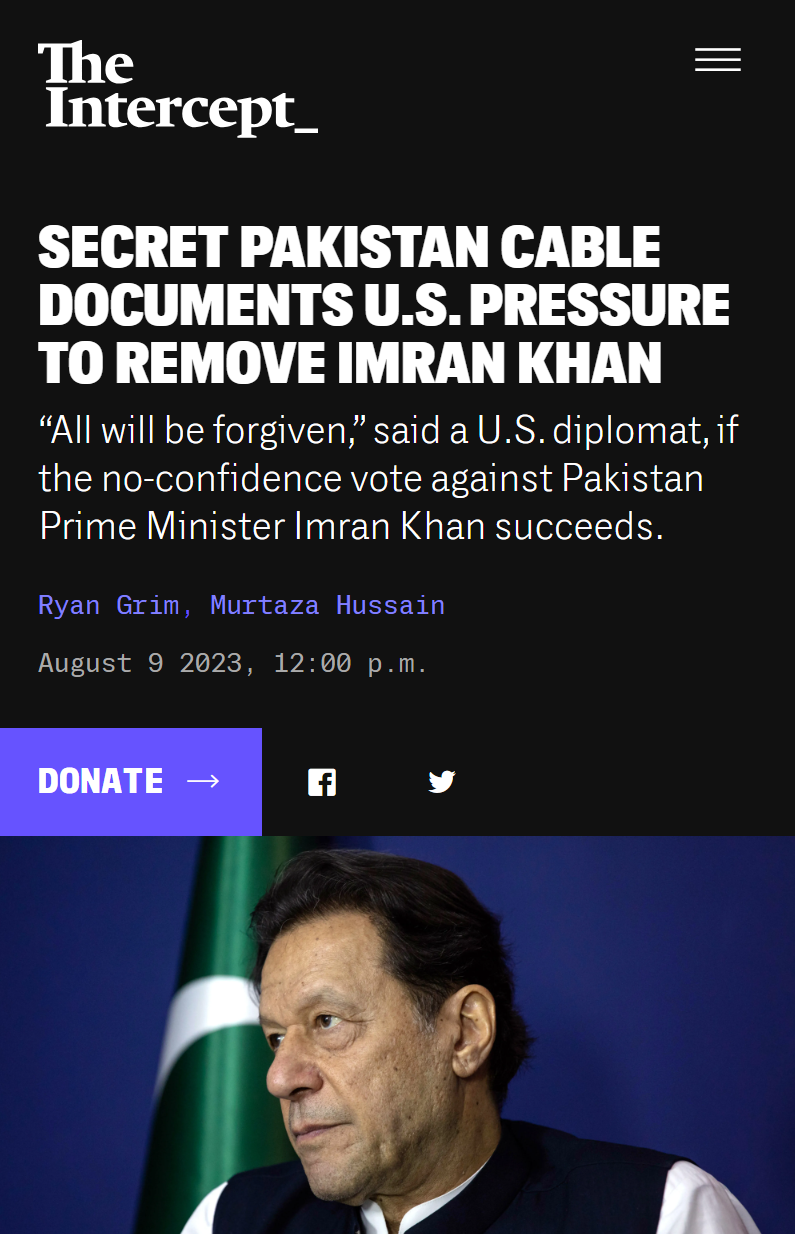A classified Pakistani government document obtained by The Intercept has exposed the U.S. State Department’s efforts to encourage the Pakistani authorities to remove Prime Minister Imran Khan from power. Dated March 7, 2022, the document reveals a meeting between the Pakistani ambassador to the United States and two State Department officials, during which the U.S. expressed dissatisfaction with Khan’s neutrality on the Russian invasion of Ukraine. The U.S. diplomat is quoted as saying, “All will be forgiven” if the no-confidence vote against Khan succeeds.
The diplomatic exchange has triggered significant attention and speculation within Pakistan over the past year and a half, as Khan’s supporters and opponents vied for control. Khan’s subsequent legal troubles escalated the political struggle, culminating in his three-year prison sentence on corruption charges. The sentence has barred Khan, a popular political figure, from participating in expected elections later this year.
The leaked cable outlines the U.S.’s strategy, offering both rewards and threats. Assistant Secretary of State for the Bureau of South and Central Asian Affairs Donald Lu is quoted as saying, “I think if the no-confidence vote against the Prime Minister succeeds, all will be forgiven in Washington because the Russia visit is being looked at as a decision by the Prime Minister.” He added, “Otherwise, I think it will be tough going ahead.”
The cable further illuminates the U.S.’s stance on Pakistan’s foreign policy regarding the Ukraine conflict. Lu noted that the U.S. was concerned about Pakistan’s “aggressively neutral position” and warned of potential isolation by Europe and the U.S. if Khan remained in office.
Although the authenticity of the leaked document has not been independently confirmed, it aligns with earlier reporting by Pakistani newspapers and other sources. The events described in the cable reflect the evolving relationship between the U.S. and Pakistan, with Khan’s removal leading to a warming of ties, as the document anticipated.
The intercepted document sheds light on the tense diplomatic environment following the Russian invasion of Ukraine. Lu’s comments during a Senate hearing hinted at U.S. frustrations with Khan’s stance on the conflict. Khan’s strong reaction to calls for Pakistan to support Ukraine, where he asserted the country’s independence in foreign policy decisions, further complicated matters.
The leak also underscores the complexity of U.S.-Pakistan relations, with the State Department denying any direct interference in Pakistan’s internal leadership decisions. The Intercept’s attempts to authenticate the document were limited by security concerns in Pakistan, and the Pakistani Embassy in Washington, D.C., did not provide a comment.
Arif Rafiq, a specialist on Pakistan, remarked that while Khan’s fate was uncertain at the time of the meeting, the cable reflects the Biden administration’s message to influential figures in Pakistan that removing Khan would lead to improved relations. The State Department maintains that allegations of interference are baseless and that they expressed concern over Khan’s Moscow visit amidst the Ukraine conflict.
History of U.S. Interference in Regime Change:
The United States has a long history of covertly and overtly overthrowing other nations’ governments. According to Lindsey A. O’Rourke, an Assistant Professor of Political Science at Boston College “Between 1947 and 1989, the United States tried to change other nations’ governments 72 times”.
Nicaragua, the 1910s: Governor Juan José Estrada’s rebellion against President José Santos Zelaya, supported by the United States due to concerns over canal competition and Germany or Japan’s involvement, led to Zelaya’s resignation, Estrada’s presidency, and a U.S.-Nicaragua treaty.
Haiti, 1915-1934: The U.S. occupied Haiti from 1915 to 1934 using gunboat diplomacy, installed a new government in 1917, dictated a new constitution, and faced resistance from armed militias during the “Caco Wars.”
Costa Rica, 1917: The U.S. government, under President Woodrow Wilson, refused to recognize Federico Tinoco’s rule in Costa Rica, providing assistance to the opposition forces that swiftly toppled his government.
Iran, 1953: The earliest acknowledged Cold War coup by the U.S., involving the removal of Iranian Prime Minister Mohammed Mossadegh for challenging British oil interests.
Guatemala, 1954: U.S. support led to the overthrow of Guatemalan President Árbenz after land reforms threatened U.S. business holdings.
Congo, 1960: U.S.-backed Belgian intervention ousted Prime Minister Lumumba due to perceived Soviet threat and business interests.
Dominican Republic, 1961: U.S.-backed dissidents assassinated dictator Trujillo to end his regime.
South Vietnam, 1963: U.S.-backed coup led to the killing of President Diem amid growing tension and discontent.
Brazil, 1964: U.S.-backed coup against President Goulart due to fear of socialist influence.
Chile, 1973: U.S. disrupted the economy and supported a coup against President Allende, leading to Pinochet’s brutal regime.
Dear TNT Reader,
At The News Tribe, our mission is to bring you free, independent, and unbiased news and content that keeps you informed and empowered. We are committed to upholding the highest standards of journalism, as we understand that we are a platform for truth.
Apart from independent global news coverage, we also commit our unique focus on the Muslim world. In an age marked by the troubling rise of Islamophobia and widespread misrepresentation of Muslims in Western media, we strive to provide accurate and fair coverage.
But to continue doing so, we need your support. Even a small donation of 1$ can make a big difference. Your contribution will help us maintain the quality of our news and counteract the negative narratives that are so prevalent.
Please consider donating today to ensure we can keep delivering the news that matters. Together, we can make a positive impact on the world, and work towards a more inclusive, informed global society.
Donate Monthly Subscription Annual Subscription





